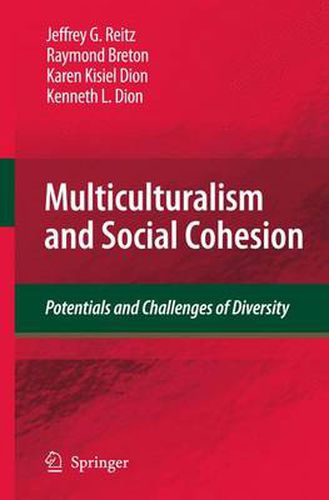Readings Newsletter
Become a Readings Member to make your shopping experience even easier.
Sign in or sign up for free!
You’re not far away from qualifying for FREE standard shipping within Australia
You’ve qualified for FREE standard shipping within Australia
The cart is loading…






This title is printed to order. This book may have been self-published. If so, we cannot guarantee the quality of the content. In the main most books will have gone through the editing process however some may not. We therefore suggest that you be aware of this before ordering this book. If in doubt check either the author or publisher’s details as we are unable to accept any returns unless they are faulty. Please contact us if you have any questions.
Does multiculturalism ‘work’? Does multiculturalism policy create social cohesion, or undermine it? Multiculturalism was introduced in Canada in the 1970s and widely adopted internationally, but more recently has been hotly debated, amid new concerns about social, cultural, and political impacts of immigration. Advocates praise multiculturalism for its emphasis on special recognition for cultural minorities as facilitating their social integration, while opponents charge that multiculturalism threatens social cohesion by encouraging social isolation.
Multiculturalism is thus rooted in a theory of human behaviour, and this book examines the empirical validity of some of its basic propositions, focusing on Canada as the country for which the most enthusiastic claims for multiculturalism have been made. The analysis draws on the massive national Ethnic Diversity Survey of over 41,000 Canadians in 2002, the most extensive survey yet conducted on this question.
The analysis provides a new and more nuanced understanding of the complex relation between multiculturalism and social cohesion, challenging uncritically optimistic or pessimistic views. Ethnic community ties facilitate some aspects of social integration, while discouraging others. For racial minorities, relations within and outside minority communities are greatly complicated by more frequent experiences of discrimination and inequality, slowing processes of social integration. Implications for multicultural policies emphasize that race relations present important challenges across Quebec and the rest of Canada, including for the new religious minorities, and that ethnic community development requires more explicit support for social integration.
$9.00 standard shipping within Australia
FREE standard shipping within Australia for orders over $100.00
Express & International shipping calculated at checkout
This title is printed to order. This book may have been self-published. If so, we cannot guarantee the quality of the content. In the main most books will have gone through the editing process however some may not. We therefore suggest that you be aware of this before ordering this book. If in doubt check either the author or publisher’s details as we are unable to accept any returns unless they are faulty. Please contact us if you have any questions.
Does multiculturalism ‘work’? Does multiculturalism policy create social cohesion, or undermine it? Multiculturalism was introduced in Canada in the 1970s and widely adopted internationally, but more recently has been hotly debated, amid new concerns about social, cultural, and political impacts of immigration. Advocates praise multiculturalism for its emphasis on special recognition for cultural minorities as facilitating their social integration, while opponents charge that multiculturalism threatens social cohesion by encouraging social isolation.
Multiculturalism is thus rooted in a theory of human behaviour, and this book examines the empirical validity of some of its basic propositions, focusing on Canada as the country for which the most enthusiastic claims for multiculturalism have been made. The analysis draws on the massive national Ethnic Diversity Survey of over 41,000 Canadians in 2002, the most extensive survey yet conducted on this question.
The analysis provides a new and more nuanced understanding of the complex relation between multiculturalism and social cohesion, challenging uncritically optimistic or pessimistic views. Ethnic community ties facilitate some aspects of social integration, while discouraging others. For racial minorities, relations within and outside minority communities are greatly complicated by more frequent experiences of discrimination and inequality, slowing processes of social integration. Implications for multicultural policies emphasize that race relations present important challenges across Quebec and the rest of Canada, including for the new religious minorities, and that ethnic community development requires more explicit support for social integration.